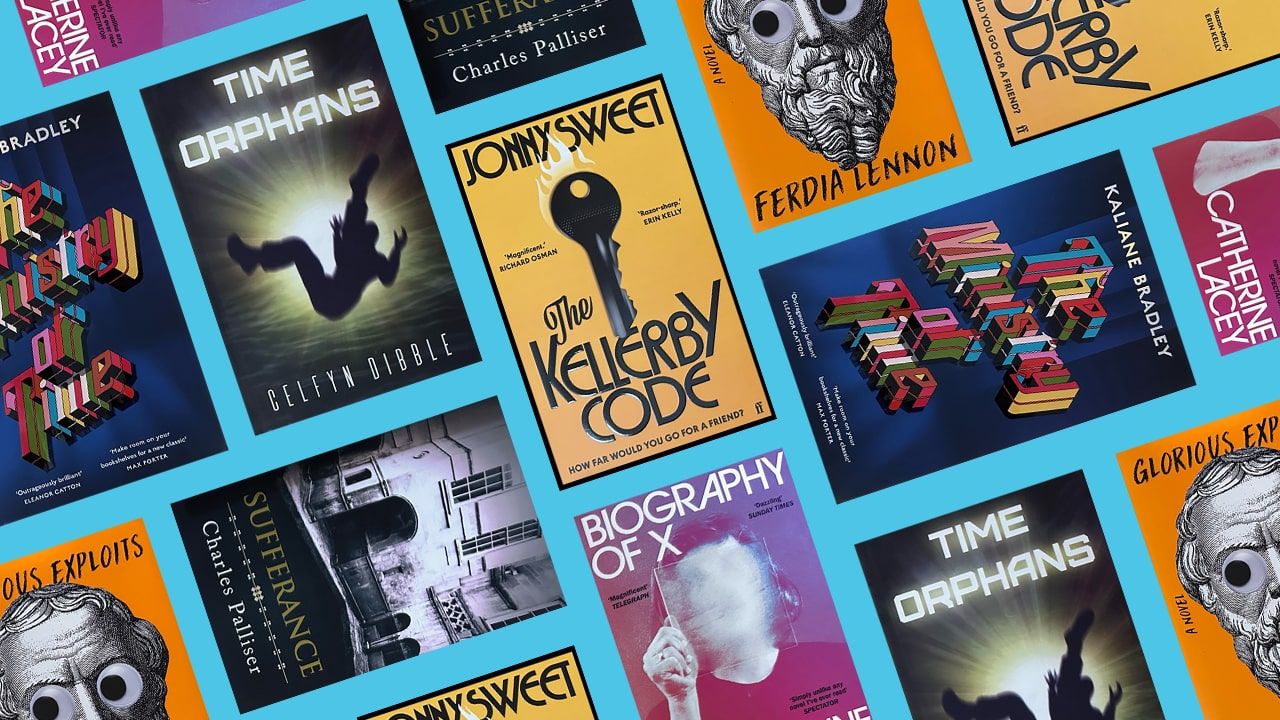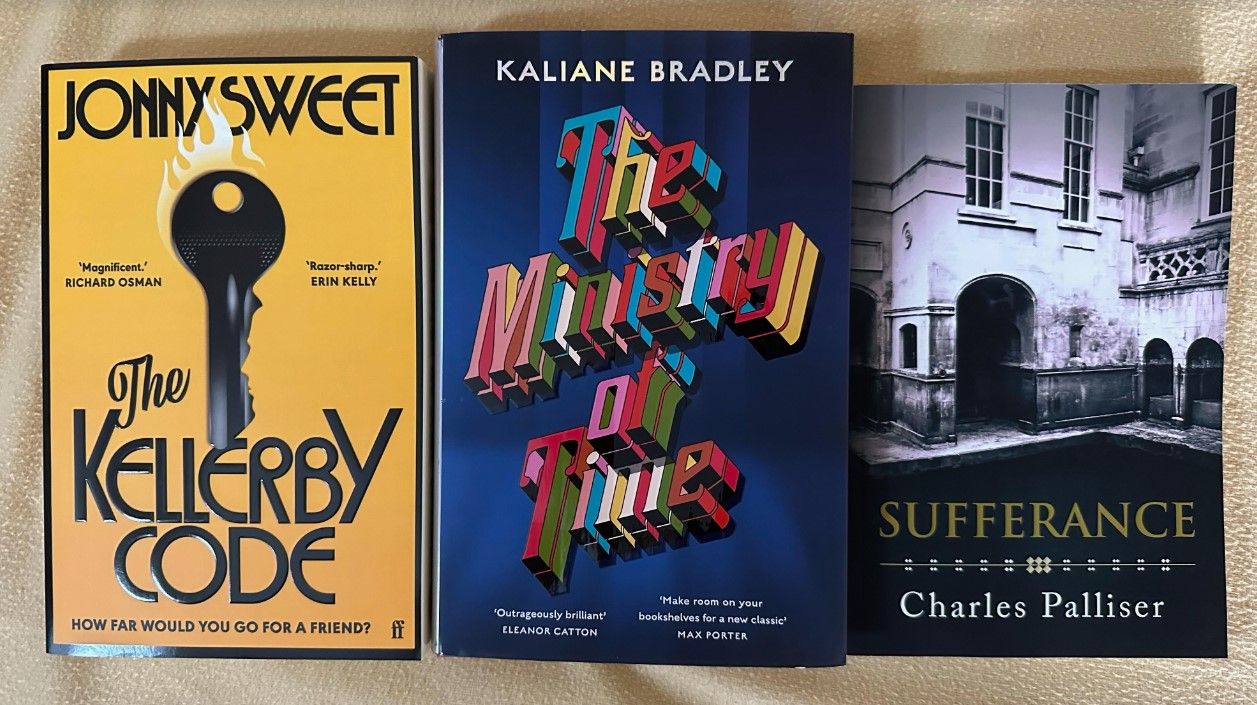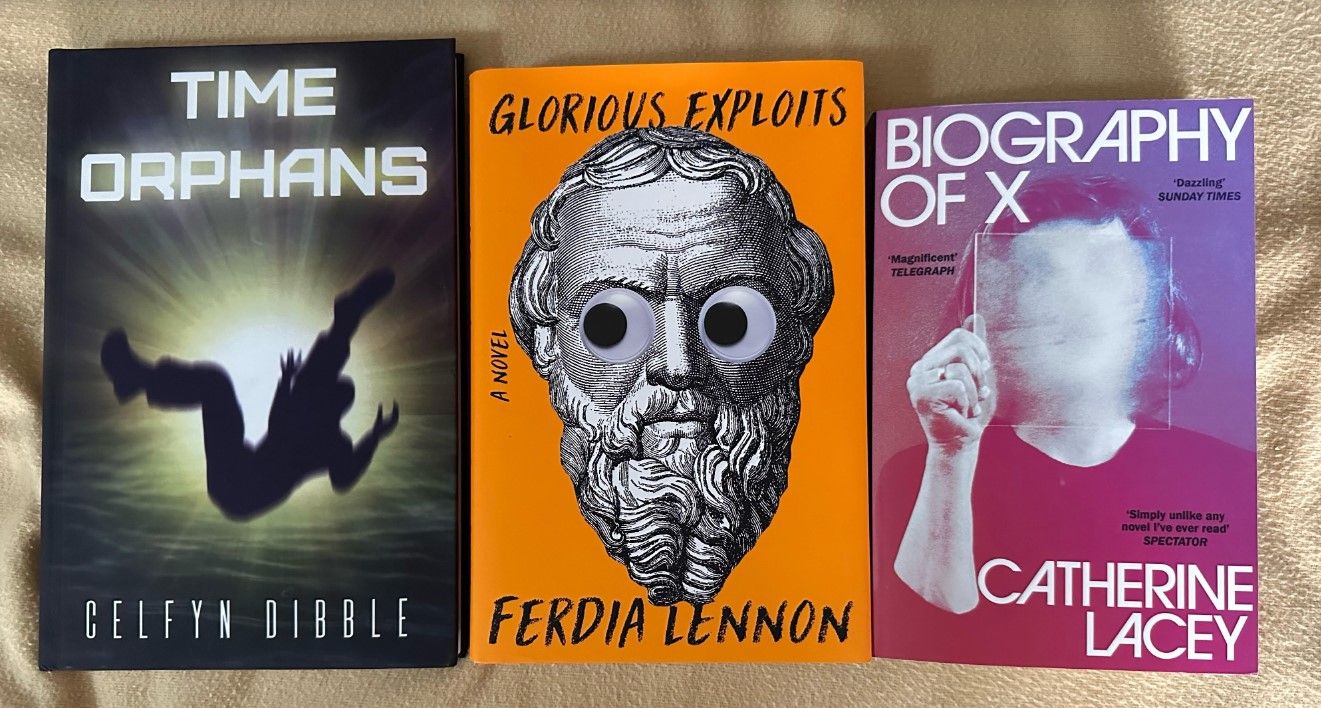IYCRMM: Timely and worldly fiction
Book reviews on "The Kellerby Code," "The Ministry of Time," "Sufferance," "Time Orphans," "Glorious Exploits, and "Biography of X"
There’s time travel woven into the fabric of two of these novels, while the others transport us to the past in rewarding ways. Then, there’s a fascinating character study, and a novel that offers alternative history, through the lens of an iconoclastic artist.

The Kellerby Code by Jonny Sweet
This debut novel is six months in the life of Edward, and his peculiar relationship/friendship with Robert and Stanza. Best known as a comedy writer for TV and movies, Jonny Sweet is behind the screenplay of Wicked Little Letters, which stars Olivia Colman and Jessie Buckley. In this first novel, he creates his own version of Patricia Highsmith’s Ripley, a person trying to operate and inveigle himself in a world he doesn’t belong to, or can afford. He’s eager to act as an errand boy for Robert, a wealthy director, and serve as household staff for Stanza, a woman Edward has professed his love to Robert for, only to discover that Stanza and Robert are romantically involved. It’s Stanza who stands to inherit the Kellerby estate mentioned in the title.
Seemingly acts of kindness take on a sinister overtone in this story. To Edward, it's his unrequited love for Stanza and the discovery of shady matters in Robert’s life that justify what he conspires to achieve, allowing one small opportunity to cascade into a series of highly questionable actions—things one wouldn’t do for or to real friends. So the novel is ultimately about loneliness, about ambition, and that striving to be someone other than oneself. While written in a bittersweet, often funny tone, it’s also brutal and visceral when it needs to be. Shafts of violence punctuate the narrative, and they help form thus studied contrast to the cozy crime genre that’s been so popular of late. This one succeeds by taking place in a more genteel strata, and yet being grittier and crueller than we would expect.

The Ministry of Time by Kaliane Bradley
Our female narrator applies to the Ministry of Time to be a "bridge" - the term used to refer to those in the Government tasked with taking care of the Ministry’s "ex-pats." These ex-pats are gathered from across history and are time-travellers, extracted from a particular time. The ex-pat assigned to our narrator is referred to as 1847, and he’s Commander Graham Gore, a member of the ill-fated Artic expedition of 1847, led by Sir John Franklin. Everyone was presumed dead from the expedition and it’s the timely intervention of the Ministry that brings Core to the present day. It’s all part of the effort to test time travel and better understand its effects and implications. What Bradley deftly creates in her debut novel is a high concept time travel romance drama, suffused with rich humor.
How to make sense of the present day for a time-traveller from the past, and how the unusual relationship between Gore and our narrator blossoms take up much of the narrative. The former is a constant source of wry humor, with the Ministry not wanting to dictate the input of new knowledge and allowing the ex-pats to explore; while still keeping close tabs on what they’re absorbing and wanting to control it. It doesn’t help that one girl they rescue from the 18th century is lesbian, and is overjoyed to discover her sexual preference is accepted in this day and age. The fact that there really was a Commander Gore in the Franklin expedition helps give this SciFi premise a tinge of credibility, and means our suspension of disbelief will be rewarded - as the last chapters become action-packed. For in the end, the book is about possibility, finding Love in unexpected places, about longing and going against all odds - universal concepts that are very real.
Sufferance by Charles Palliser
In an unidentified occupied European country, amidst internal strife and war, a well-meaning man, father to two daughters, extends hospitality to the schoolmate of his younger daughter. Despite being of modest means as an accountant, he persuades his wife that this schoolmate could be the key to future career advancement. The girl comes from a wealthy family, stranded in their mansion with only staff, as her parents are delayed in the capital. Unable to return home due to the country's turmoil, he offers her shelter until her family can reunite. The consequences of this decision drive the narrative of this compelling novel.
Palliser may be best known for the chunky historical mystery novel, The Quincunx, which was avidly read back in 1989. Compared to Quincunx, this is a slim volume; but the number of pages belie the impact and mastery of the language contained within the covers. The girl belongs to a community that is being targeted by the ones occupying the country, and this complicates the matter of the family being hospitable. Within the 200 and some pages, Palliser crams a lot of action, contemplation, and narrative, as the screws are tightened on the whole family and their controversial border. That our narrator is himself unreliable in explaining his motives for having offered shelter to this young girl, is part of what in the narrative drive makes this such a compelling read. Ordinary people made desperate.

Time Orphans by Celfyn Dibble
The time travel genre is a well-travelled one, and we can even trace its beginnings to HG Wells’ The Time Machine. So for some observers, it’s all been done before. Kudos then to Kaliane Bradley for her entry to the genre, as reviewed above. This novel from Dibble follows a more conventional route but manages to satisfy by focusing on the psychological makeup of the type of person who would volunteer for time travel. In 2013, down-and-out orphan Richey Lamacq responds to a London advertisement and meets young scientist Anton Pope. As the narrative unfolds, Richey is transported to 1913, and a significant aspect of the novel is his disorientation and how he copes with his circumstances. Eventually, he is compelled by circumstances to enlist in the ongoing war and is sent to the Somme.
It may take us more than halfway through the book, but the plot developments that occur at that point allow Dibble to rise to the challenge, infusing emotional depth into his storyline. From Richey to Anton and his fellow scientist Emma, as well as their mentor Professor Evans, an intricate nexus of interconnections and coincidences emerges, fully resonating throughout the story. If anything, readers may regret how it all unfolds in the last fifty pages of the book. As a result, just as it gets interesting the novel comes to an end. Interludes on the coast off India, and on tropical islands are too fleeting. It’s has all the makings of an epic time travel quest, but one that hasn’t been fully developed or comes to a close abruptly, and just fails to elevate the novel into something far greater than what we have in our hands.
Glorious Exploits by Ferdia Lennon
Like the fools in a Shakespeare play but now made main protagonists, this novel of Lennon would have Syracuse potters, Lampo and Gelon, become directors of the Euripides drama, Medea. Set in Sicily during the time of Peloponnesus, the two potters visit the quarry where the captured Athenians have been incarcerated. There, they seek Athenians familiar with the epic poetry of Euripides, operating on the principle that one can "hate the people, but love their Art". It’s after visiting the tavern and getting royally drunk that Gelon decides on the quixotic adventure of staging Medea as a full production. It’s a crazy premise, that hinges on the love of art, a meditation of human will, and examining this power of art during a time of war, and how a form of brotherhood can be forged in Art.
It isn’t long before The Trojan Women is included in the playlist, especially when Gelon hears that Euripides himself considers it’s his best written work. Lampo is the more amiable of the two, and there’s a narrative strand that has him courting a slave girl from the local tavern. Gelon is grieving for the loss of his son and his wife’s disappearance, and it’s only through these Greek plays does he rekindle the spark of life within him, as he entreats the captured Athenians to join him in his dream. What’s ingenious is how Lennon has all this happen in a contemporary Irish voice. It may seem odd at first, but it actually works. The two dreamers soon find out that staging a play is fraught with danger, danger that can rise up and be as violent as war itself. Wonderful storytelling, with larger than life characters.
Biography of X by Catherine Lacey
Iconoclastic artist/musician/writer X has passed away, prompting her widow CM to write the definitive biography of the woman she revered and lived with. This decision is fueled by the success of an unauthorized biography filled with misguided claims presented as indisputable facts. Set in an alternative America where X was raised in the Southern Territory, a fascist theocracy that seceded from the USA after World War II and reunited in 1996, this book serves as a thought experiment that challenges traditional novel structures. It blends satire of the art and music worlds with political intrigue, skillfully combining fact and fiction. The narrative is structured not as Catherine Lacey's creation but as the biography authored by CM.
The thought process of CM is ever present in the narrative. When she seeks to unravel X’s early days in the South, she interviews individuals who encountered her back then, and one speaks about him having been her lover. But when he asks CM if she ever met X, CM denies it, explaining that as biographer she should project objectivity. You can either view this as an unreliable, dissembling narrator/author and sympathize with her effort to maintain objectivity given the subject matter. It's ultimately up to us as readers. But what we have is undeniably ambitious—Lacey truly pushes the boundaries of the novel, exploring what can be achieved through sheer imagination and creativity. Her artful blending of fact with fiction challenges conventions. Whether it ultimately succeeds and is considered brilliant is a personal judgment for each reader.